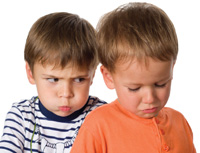 Bullying is in the news more and more these days. Bullying-related tragedies — like one suicide last month in Massachusetts — have parents and educators on high alert. States are putting tough anti-bullying policies in place; online, there is a multitude of resources for parents who worry that their child may be a victim.
Bullying is in the news more and more these days. Bullying-related tragedies — like one suicide last month in Massachusetts — have parents and educators on high alert. States are putting tough anti-bullying policies in place; online, there is a multitude of resources for parents who worry that their child may be a victim.
But when you think “bully,” do you think “preschool”? Probably not. Yet a 2005 Brigham Young University study found that “relational aggression” — sometimes called “covert bullying” — can start as early as age 4. Researchers found that such bullying, generally defined as “manipulating the relationships of others in order to cause them harm,” is usually done so the bully can achieve social prominence. And they found that both preschool boys and girls were equally likely to bully, though their styles may differ.
But can preschoolers really be bullies? Or is this just negative — but age-appropriate — behavior? The answer is controversial.
Bullying — or testing?
According to Barbara Coloroso, author of The Bully, the Bullied, and the Bystander, bullying is “a conscious, willful, and deliberately hostile activity intended to harm, induce fear through the threat of further aggression, and create terror.” In other words, there is intent to inflict harm and pleasure taken from doing so.
Casey Birdsall, director of the Children’s Center at the Evergreen State College in Olympia, says the difficulty lies in determining whether a behavior is bullying or just the normal experimentation that goes on in preschool years. “At this age, kids are trying to figure out their place and testing their power,” she says. And some acts that are perceived as potentially “bullying,” such as taking away a toy or shoving, can be something as simple as one child not knowing how to ask another to play. Birdsall thinks a lot of the behaviors people might perceive as bullying are instead calls to action — to teach the child to communicate effectively, for example, or to express anger or anxiety in appropriate ways.
Developmentally, preschool-age kids have only limited ability to manage their behaviors, says Dr. Rebecca Cortes, a research scientist at the University of Washington’s Department of Psychology and one of the developers of the PATHS Preschool curriculum. “Everything is a learning experience at this age,” she says; kids test the boundaries of acceptable behavior, looking for the limits of their power. Cortes worries that labeling behavior as bullying can have long-term consequences, because a child who goes into grade school with that label may have trouble living it down.
How do we know?
Birdsall and Cortes say that though bullying does happen in preschools, the subtleties of determining what is normal at this age are complex. So how can a parent know what they are seeing on the playground?
The short answer? Look at the result, suggest experts. If the “victim” of the behavior is upset for a short time, but then seems fine, it’s probably not bullying. But if that child becomes withdrawn, doesn’t want to go to school or seems concerned about why the other child does not like them, you should raise a red flag. The key, Birdsall says, is to remember that some degree of socially imperfect behavior is normal — and not everything needs an adult response. Birdsall and Cortes agree: There is value in letting your child learn how to handle low-level normal behaviors, rather than jumping in at every perceived offense. At Birdsall’s center, teachers make sure kids understand that they do not have to play together. If someone does something they don’t like, the teachers tell the kids they can say, “I only play with people who are kind to me.” Often, she says, that is enough to stop the aggressive behavior.
But when it’s not enough — when behaviors persist or seem dangerous — you may need to take action. Talk to your child’s teacher and do some research (see parentmap.com/more for resources). And let your child know that they deserve friends who are kind to them, and that they have the right to walk away from those who are not.
Kathryn Russell Selk lives, works and writes about parenting issues in Seattle.











